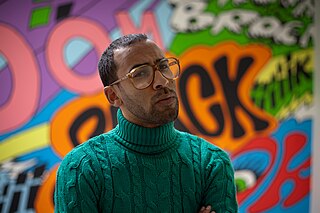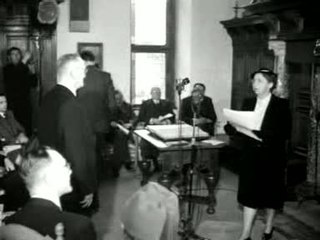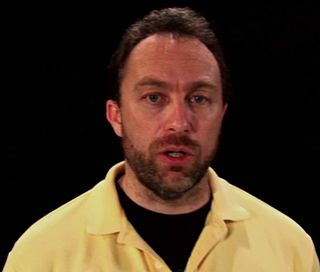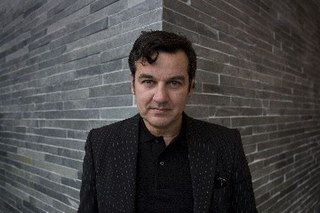VPRO is a Dutch public broadcaster and part of the Dutch public broadcasting system. It was founded in 1926 as a liberal Protestant radio station. In the 1950s and 1960s, it gradually became social liberal rather than Protestant, and the original meaning of the acronym was eventually dropped.
Suhayl Saadi is a physician, author and dramatist based in Glasgow, Scotland. His varied literary output includes novels, short stories, anthologies of fiction, song lyrics, plays for stage and radio theatre, and wisdom pieces for The Dawn Patrol, the Sarah Kennedy show on BBC Radio 2. Saadi was born in Beverley to Pakistani parents in 1961.

Thomas van Aalten is a Dutch writer. He made his debut with a story in the literary magazine Zoetermeer, at the age of 19. Van Aalten has written the novels Sneeuwbeeld (2000), Tupelo (2001), Sluit Deuren en Ramen (2003), Coyote (2006) and De Onderbreking (2009) and several articles for magazines such as 3voor12, Passionate, VARA TV Magazine, Revu and Vrij Nederland. Van Aalten's style is characterized by absurd dialogues, creepy atmospheres and strange characters. He is a F.C. St. Pauli enthusiast and fan of rock music like Motörhead, The Sisters of Mercy. Van Aalten also often works together with Berlin-based burlesque filmmaker Edwin Brienen.

Willem Theodoor "Wim T." Schippers is a Dutch artist, comedian, television director, and voice actor. During the 1960s, he worked mostly as a visual artist, associated with the international Fluxus-movement. As a television writer, director, and actor he is responsible for some of the most notable and controversial shows on Dutch televisions from the 1960s to the 1990s, creating a number of lasting characters and enriching the language with terms and expressions first coined in his shows. In addition, he voiced the characters of Ernie and Kermit the Frog on Sesamstraat, the Dutch version of Sesame Street. For his shows, he has written over three hundred songs, and his reputation has changed from being Dutch television's "enfant terrible" to an acknowledged master in a variety of genres.

Black Book is a 2006 war drama thriller film co-written and directed by Paul Verhoeven, and starring Carice van Houten, Sebastian Koch, Thom Hoffman and Halina Reijn. The film, credited as based on several true events and characters, is about a young Jewish woman in the Netherlands who becomes a spy for the resistance during World War II after tragedy befalls her in an encounter with the Nazis. The film had its world premiere on 1 September 2006 at the Venice Film Festival and its public release on 14 September 2006 in the Netherlands. It is the first film that Verhoeven made in his native Netherlands since The Fourth Man, made in 1983 before he moved to the United States.

Halina Reijn is a Dutch actress, writer and film director.

Bas Bron is a musical artist and a producer of mostly electronic music from Amsterdam, Netherlands.

Claw Boys Claw are a Dutch band, formed in Amsterdam. The core members of the band are Peter te Bos (vocals) and John Cameron (guitar). After some years of inactivity, the band started playing live again in 2007.

Abdelkader Benali is a Moroccan-Dutch writer and journalist.

Lambertus Jozef (Bert) Bakker was a Dutch writer and publisher in the Netherlands. He wrote literary studies, two novels, poetry, and children's books. In World War II he was involved in the Dutch Resistance and assisted in the publication of Vrij Nederland. After the war he founded a publishing company under his own name; his nephew, also named Bert Bakker, ran the company until 1993. In 1953 he founded the literary magazine Maatstaf, which he edited until 1969. He was described as a "living legend" in the Dutch publishing industry, having supported and published authors such as Adriaan Roland Holst, Martinus Nijhoff, Gerrit Achterberg, and Neeltje Maria Min.
Het Brein Dat Kwam Uit De Ruimte is an experimental electronic Dutch band from Heemskerk.

The Truth According to Wikipedia, also referred to as Wiki's Truth, is a Dutch documentary about Wikipedia directed by IJsbrand van Veelen. It was screened at The Next Web conference in Amsterdam on 4 April 2008 and broadcast by the Dutch documentary series Backlight on Nederland 2 on 7 April 2008. It was subsequently made available through American Public Television.
Maatstaf was a Dutch literary magazine, founded in 1953 by Bert Bakker. Bakker, who was the magazine's first editor, is credited with bringing in poets such as Ida Gerhardt. The magazine had a reputation for publishing "realist" authors, and was categorized as "neoromantic," one of a number of Dutch literary magazines in an "anti-experimental tradition." Dutch poet Gerrit Komrij, who edited the magazine from 1969 on, was the subject of a themed issue in 1984, and again in 1996, this last time centered on a collection of ten homo-erotic poems he had published in 1978, Capriccio. In that same year, 1996, the magazine, with a new team of editors, was renewed following a "conservative revolution."

Kensington is a Dutch rock band from Utrecht that was formed in 2005. The band's lineup of lead vocalist Eloi Youssef, guitarist Casper Starreveld, bassist Jan Haker and drummer Niles Vandenberg remained consistent for 14 years beginning in 2008. The band has since released two EPs and five studio albums: Borders (2010), Vultures (2012), Rivals (2014), Control (2016) and Time (2019).

Hendrik Johannes Adrianus "Henk" Hofland, also commonly known as H.J.A. Hofland, was a Dutch journalist, commentator, essayist, and columnist. He is often referred to as the éminence grise of Dutch journalism. In 1999 he was named Dutch "Journalist of the century" in a nationwide poll among his peers. He once described himself as belonging to the "anarcho-liberal community", though his political orientation is that of the secular center of society.

Jerreley Zanian John Slijger, known by his stage name Kempi, is a Dutch rapper.

Stephen Emmer is a Dutch composer, arranger, producer, sound designer and musician. Best known as a composer for Dutch television and film, Emmer has released four albums as a solo artist, each with a different theme or concept. Vogue Estate released in 1982, is the soundtrack for an imaginary film; 2007’s Recitement is a spoken word album of poetry and prose; International Blue, released in 2014, is a tribute to pop crooners. In 2017 Emmer released Home Ground, a neo-soul album that addresses social issues related to origin.

Ellen Jens was a Dutch television director and producer, best known for her collaboration with Wim T. Schippers on VPRO television. She produced and directed a large number of other television shows, especially on literature and art, and was referred to as a "television legend".

Robert Dulmers is a Dutch writer and journalist. Dulmers is known for his years of reporting from the former Yugoslavia during the Yugoslav Wars, during which he was arrested and interrogated. He has written several books, one based on his experiences in the former Yugoslavia and another, on Pope John Paul II's succession, based on years he spent studying for the priesthood in Rome. Dulmers mostly works freelance and has built a reputation as a single-minded and somewhat eccentric writer, difficult to work with but highly praised by his colleagues.
Emy Koopman is a Dutch writer, journalist and presenter. She has written for De Groene Amsterdammer, de Volkskrant, de Correspondent and hard//hoofd.















